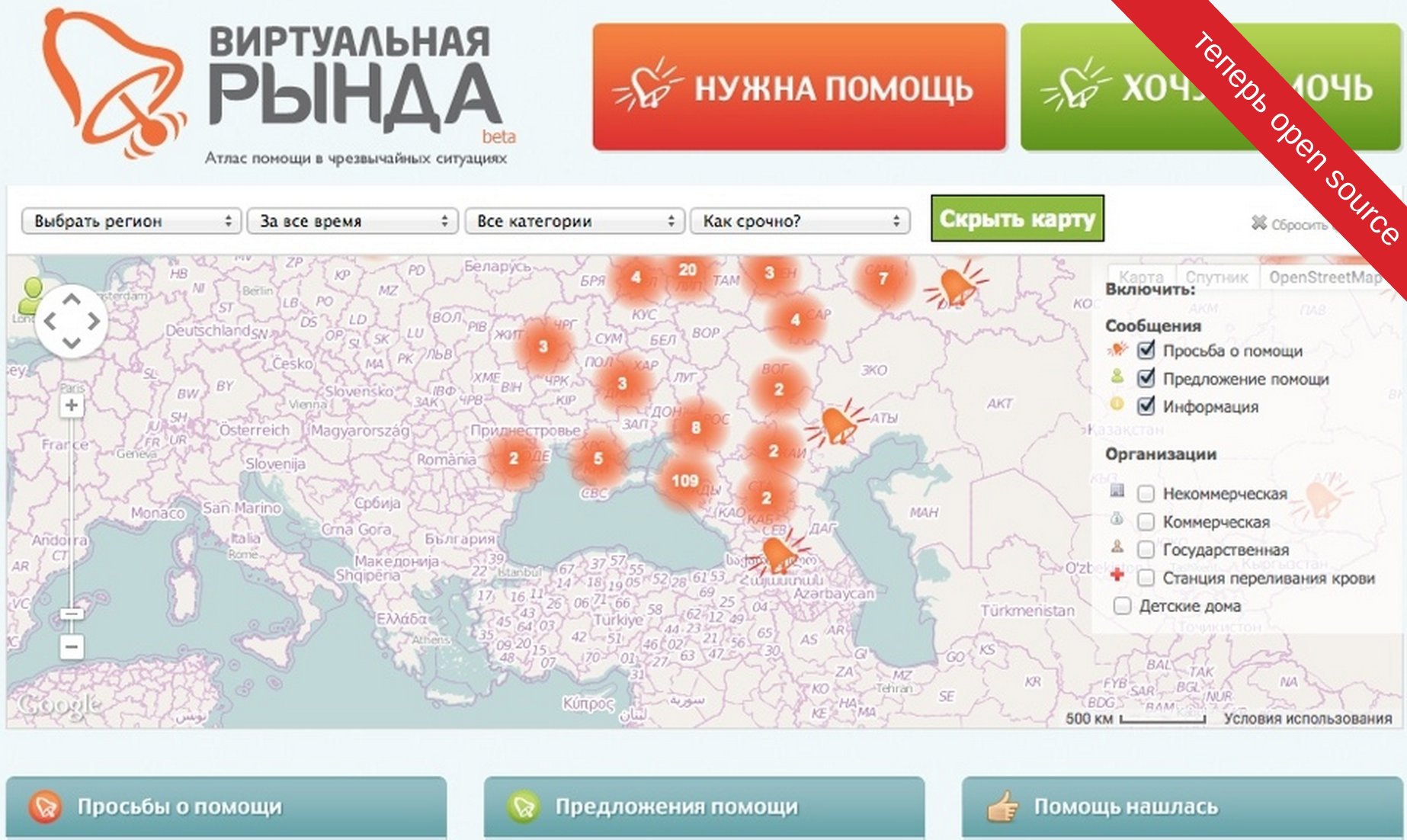Open-rynda: krausers solution for emergency and network coordination of volunteers

What is OpenRynda?
Opensores version of Virtual Rynda, allows you to coordinate the requests of the victims and offers of help from volunteers. Made on the basis of 4 years of experience (Virtual Rynda works with 2010).
Why?
- You raise OpenRynd'
- Volunteers offering assistance the
- Moderators — and coordinate the process the
- Profit! Problem solved!
Suddenly, a fire/flood/tornado/meteor/Death Star the
Victims of fire/flood/tornado/meteor/death star/censorship note on the map any problems
the
Where?
You can take here.
Written in Python, using Django, and is released under the open MIT licence.
System requirements: Python 2.7+, spatialite, GEOS, PROJ.4, Virtualenv.
How to put?
Test version:
the
Create and activate virtualenv:
virtualenv rynda
source rynda/bin/activate
Clone the repository:
git clone https://github.com/sarutobi/Rynda.git
go to the cloned repository:
cd Rynda
Install all dependencies:
pip install -r requirements\test.txt
Copied mysettings.py.example mysettings.py
Define the structure of the database and the root password:
bash createdb.sh
Twice, enter the root password.
The name of the default root: admin
Run local server:
python manage.py runserver
Open in browser ://localhost:8000
To test the system, run:
$python manage.py test
working version:
To install in regular mode under Apache web server you need to install the module mod-wsgi.
For example in Debian:
$ sudo aptitude install libapache2-mod-wsgi
If you have a module mpm-itk, it may be the reason that the module mod-wsgi does not work.
Then add the VirtualHost configuration.
Run in daemon mode is the recommended method of running mod_wsgi on non-Windows platforms. To create a process, you need to add the WSGIDaemonProcess and WSGIProcessGroup directives.
The format of the directives:
process name WSGIDaemonProcess processes= threads= python path=
where:
python-path is the path to the libraries to the virtual environment of the website in the format: /path/to/mysite.com:/path/to/your/venv/lib/python2.X/site-packages
processes — defines the number of daemon processes that should be running in this group of processes defined by the WSGIProcessGroup Directive. By default (when the number is not defined) will be run only one process.
threads — specifies the number of threads for processing requests for each of the processes of the demon within the group of processes defined by the WSGIProcessGroup Directive.
WSGIProcessGroup process name
You also need to allow access to wsgi.py file. If you are using Apache version 2.4 or older, replace the line Require all granted to Allow from all and add the line Order deny,allow above it.
Example:
the
<Directory /path/to/mysite.com/mysite/Rynda/scripts>
<Files wsgi.py>
Require all granted
</Files>
</Directory>Another important Directive WSGIScriptAlias. It specifies the location of your applications (/ indicates the root directory), the second value indicates the location of the file “WSGI” – see below – on your system, usually in the root of the project. (in the example mysite). These settings will allow Apache to treat any request from the directory specified as the base using the WSGI application that is stored in it.
the
WSGIScriptAlias / /path/to/mysite.com/mysite/wsgi.pyIn addition, you must specify the position of static files.
Collect static files in a folder that you have specified in the settings:
the
manage.py ./manage.py collectstaticSpecify Apache's location to this folder:
the
Аlias /static/ /path/to/mysite.com/staticIt is better to use nginx as a find out to hand out static files, as it does it more efficiently than Apache:
the
location /static {alias /path/to/mysite.com/static; }the
<Directory /path/to/my/site/www/demo.openrynda.com/Rynda/rynda/Rynda>
<Files wsgi.py>
Order allow,deny
Allow from all
</Files>
</Directory>
<VirtualHost 111.22.23.11:81 >
ServerName demo.openrynda.com
DocumentRoot /path/to/my/site/www/demo.openrynda.com
Openrynda WSGIDaemonProcess processes=5 threads=1 python-path= /path/to/my/site/www/demo.openrynda.com/Rynda:/path/to/my/site/www/demo.openrynda.com/rynda/lib/python2.7/site-packages:/path/to/my/site/www/demo.openrynda.com/rynda/lib/python2.7/
WSGIProcessGroup openrynda
WSGIScriptAlias / /path/to/my/site/www/demo.openrynda.com/rynda/Rynda/wsgi.py
Аlias /static/ /path/to/my/site/www/demo.openrynda.com/static # static location (if necessary change)
ServerAlias www.demo.openrynda.com
</VirtualHost>How can we help?
After 1200+ commits, the project still requires some improvements (for example, a simple installer "for the average user"), so please send pullrequests!
Authorship
The original project was developed by many people at different times, open-source version made Valera Ilyichev (readonly) with the moral support of Greenhouses of social technologies.